The dirt on soil: Why healthy soil matters
OPINION: Every year, December 5 marks World Soil Day. This date wasn’t chosen at random, it’s the birthday of the late King Bhumibol Adulyadej of Thailand, a passionate advocate for soil stewardship.
 The pact underscores a joint commitment to advancing new and better farming and growing practices in New Zealand’s agricultural sector.
The pact underscores a joint commitment to advancing new and better farming and growing practices in New Zealand’s agricultural sector.
The signing of a Memorandum of Understanding (MOU) between Lincoln University and Ballance Agri-Nutrients is being hailed as a significant milestone.
The pact underscores a joint commitment to advancing new and better farming and growing practices in New Zealand's agricultural sector.
Lincoln University's Provost, Professor Chad Hewitt says the agreement establishes a framework for ongoing collaboration, with a focus on identifying and prioritisig opportunities for joint projects.
"These opportunities include improving planning and co-ordination, conducting research and demonstrations on Lincoln University's farms and enhancing environmental stewardship.
"The collaboration also seeks to foster innovation, commercialisation, and promotion of the agricultural sector to the public and policy makers."
One key aspect of this partnership is that it creates a foundation for ongoing and future collaboration with the university says Dr Stuart Kay, innovation leader at Ballance.
"We believe this collaboration will have a positive impact on our industry and will strengthen our connections with universities while showcasing our commitment to innovation and sustainability.
"We are keen to continue our journey of innovation, sustainability, and collaboration."
Both Lincoln University and Ballance share a common vision of a prosperous, sustainable, and innovative future for New Zealand's primary industries. By joining forces, they aim to drive positive change for Kiwi farmers and growers, ensuring they remain profitable and sustainable while meeting the increasing expectations of consumers, both in New Zealand and around the world.
Climate change has brought a pressing need for rapid and effective solutions, especially in areas like greenhouse gas emissions, carbon farming, and carbon sequestration. Lincoln and Ballance say they are committed to tackling these challenges head-on, as well as promoting on-farm diversification and adapting to climate-impacted land use changes.
Voting has started for the renewal of DairyNZ's milksolids levy.
The most successful catchment groups in NZ are those that have 'a source to sea' approach.
Associate Agriculture Minister and Manawatu dairy farmer Andrew Hoggard says the free trade agreement (FTA) negotiated with India is not a bad deal and his party, Act, will support it when it goes before Parliament.
Newly released data from Environment Canterbury (ECan) Farm Environment Plan (FEP) audits are showing a dramatic lift in environmental performance across the region.
A solid recovery of global dairy prices this year makes a $9.50/kgMS milk price almost a shoo-in for this season.
As New Zealand marks the United Nations’ International Year of the Woman Farmer 2026 (IYWF 2026), industry leaders are challenging the misconception that women only support farming.
OPINION: Fonterra may be on the verge of selling its consumer business in New Zealand, but the co-operative is not…
OPINION: What does the birth rate in China have to do with stock trading? Just ask a2 Milk Company.